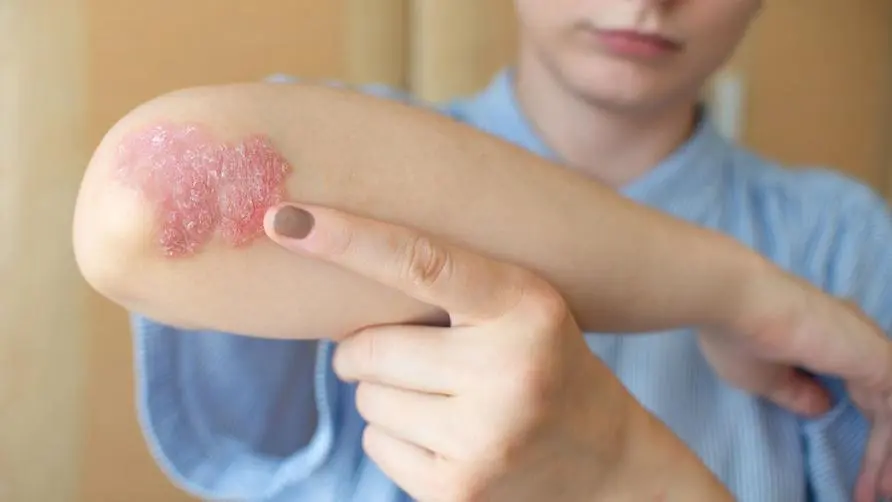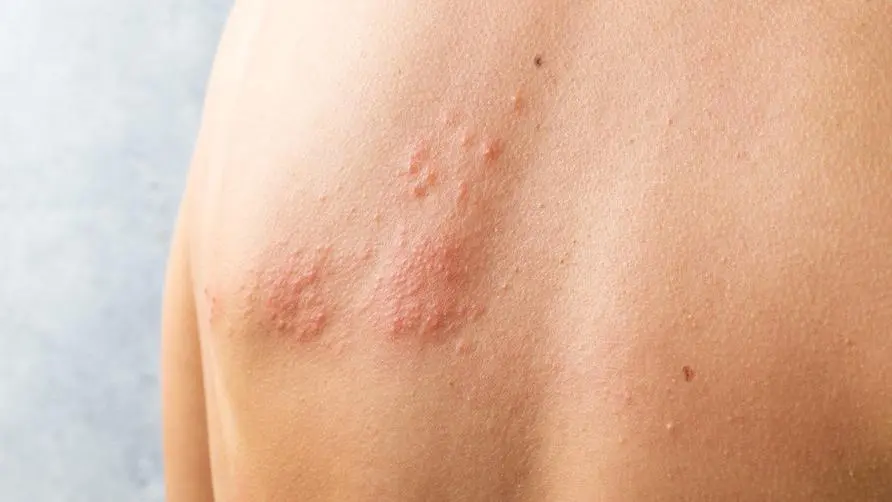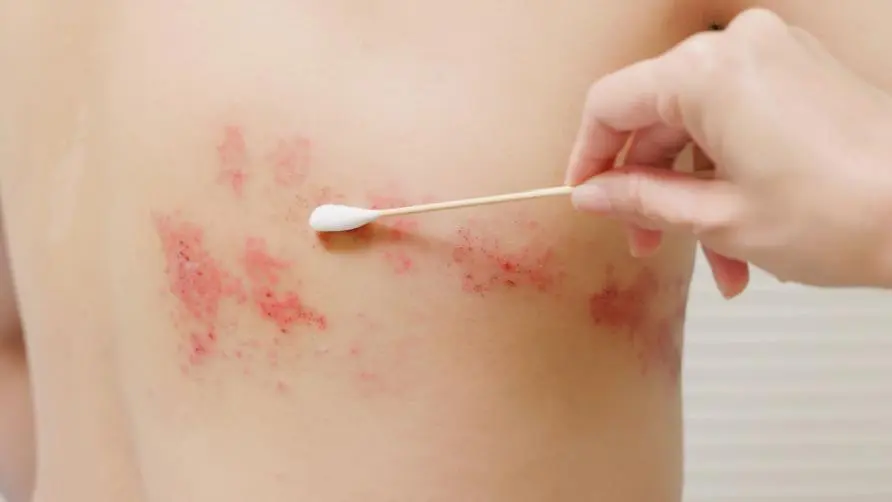Shingles is more painful than childbirth. Doctors reveal the "6 major groups" are most dangerous: taking preventive measures is the key to staying away from skin snakes
Shingles is caused by the varicella-zoster virus. According to U.S. statistics, up to 99.5% of adults over the age of 40 have been infected with the varicella-zoster virus. According to statistics, about 1 in 3 people in Taiwan may suffer from herpes zoster, commonly known as “herpes zoster” at least once in their lifetime. The high prevalence rate and the possible accompanying post-herpetic neuralgia are health issues that cannot be ignored by Taiwanese people. Hidden worries.
Is it easier to get skin snakes after being diagnosed with COVID-19? Doctors reveal “6 high-risk groups” for shingles
Wu Zhixing, director of the Department of Family Medicine, National Cheng Kung University School of Medicine, said that after infection with the varicella-zoster virus, the virus may hide in the ganglia. When immune function declines or ages, the virus may appear along the nerves, causing symptoms that last for seven weeks. A unilateral vesicular rash that lasts up to ten days can cause burning, severe pain, stinging, skin scarring, and postherpetic neuralgia that may last for months to years.
Wu Zhixing, director of the department, explained that according to current clinical observations of people who are susceptible to varicella zoster virus infection, the following groups may be at higher risk:
Middle-aged and elderly people over 50 years old: As age increases, the body’s immune function will gradually weaken, and this is the opportunity for the varicella-zoster virus to attack in the body.
People with a history of herpes zoster: Patients who have had herpes zoster before have a higher chance of getting it again than those who have never been infected.
Patients with chronic diseases: Chronic diseases are one of the great risk factors for herpes zoster. Chronic pulmonary obstructive disease (COPD), diabetes, etc. may increase the prevalence of herpes zoster.
People with low immunity: Cancer patients, people infected with HIV, and people receiving immunosuppressant treatment may all be people with low immunity.
Have been infected with COVID-19: According to research, COVID-19 may induce an outbreak of herpes zoster, which may increase the chance of developing herpes zoster by about 1/7.
Those with abnormal work and rest schedules or high stress: Excessive stress or abnormal work and rest schedules will affect the operation of the immune system, leading to an increased incidence of herpes zoster.
Can’t get complete relief even with morphine? Postherpetic neuralgia may be more painful than childbirth
Postherpetic neuralgia caused by herpes zoster not only affects the quality of life, but may also cause serious chronic pain problems. Department Director Wu Zhixing pointed out that about 18% of herpes zoster patients will suffer from post-herpetic neuralgia, which is classified as “moderate to severe level” according to the pain index. The pain is similar to an electric shock, and the pain symptoms may last for several months or even More than several years.
Wu Zhixing, director of the department, said that the course of herpes zoster progresses rapidly. If you do not pay special attention to your physical condition within 72 hours after the onset of the disease, you will often miss the golden treatment period. “If herpes zoster is not treated in time, the only way to reduce complications is through medication. If the complication of ‘post-herpetic neuralgia’ occurs, some patients cannot be completely relieved even if they take a variety of painkillers! "
Therefore, Director Wu Zhixing reminds high-risk groups that if they experience skin tingling, numbness, burning or itching, or feel a decrease in physical strength, or have a large area of rash on the skin combined with fever or cold, they should pay special attention to whether it is a band. If there are signs of herpes, you should seek medical attention as soon as possible to avoid herpes zoster and other complications.
Will long-skinned snakes affect vision and hearing? Combined “depression” may be life-threatening
Besides severe pain, what complications can shingles cause? Director Wu Zhixing reminded that the varicella-zoster virus lurks in ganglia, which are almost all over the body and may affect various organs. For example, if it occurs around the eyes and ears, it may cause vision or hearing damage; some studies It has also been pointed out that herpes zoster may increase the risk of cardiovascular and cerebrovascular diseases, and increase the incidence of myocardial infarction, stroke and other diseases.
In addition, herpes not only affects physical health, but may also cause serious psychological problems. Wu Zhixing, director of the department, explained that because the pain of post-herpetic neuralgia is very severe, patients often suffer from it, affecting their physical and mental state, and even affecting their daily life and work.
“Don’t think that the pain of shingles will go away in a week. In fact, the complications it brings are often the most troublesome!” Wu Zhixing Department Director emphasized.
Prevention is the best way to stay away from shingles! Doctor: Taking preventive measures is key
The varicella-zoster virus usually hides in the human body, and people tend to underestimate or ignore the possible risks. Wu Zhixing, director of the department, pointed out that although antiviral drugs can be used to treat herpes zoster in the early stages, their main effects are to accelerate the healing of skin lesions or relieve pain. Once the golden treatment period is missed, many patients still face long-term chronic pain problems, although specific analgesics are available in the future.
Director Wu Zhixing said that active prevention is the key to staying away from herpes zoster. Prevention methods that can be done in daily life include regular work and rest, balanced diet, regulating life stress, etc. In addition, vaccination with herpes zoster vaccine is known to be effective against herpes zoster. and postherpetic neuralgia in a defensive manner. Which groups need the shingles vaccine most? Wu Zhixing, director of the department, suggested that the first group to be considered is those over 50 years old; if you have chronic diseases, low immunity, family history, etc., you should discuss the risks with the attending physician to decide whether the injection is suitable. In addition, it is also recommended that young people reduce inappropriate activities, such as staying up late and overworking; maintaining an appropriate amount of exercise and a good lifestyle will help maintain normal resistance, which is the key to prevention!
References:
Harpaz R, et. al. MMWR Recomm Rep. 2008 Jun 6;57(RR-5):1-30
1998 Science and Technology Research and Development Plan of the Bureau of Disease Control and Prevention, Department of Health, Executive Yuan
https://www.cdc.gov/shingles/hcp/clinical-overview.html (Accessed Aug 2023)
Kim YJ;Journal of Korean medical science;2019;34;1-10
Joesoef RM;Mayo Clinic proceedings;2012;87;961-7
Bhavsar A, et al. Open Forum Infect Dis. 2022;9 (5):ofac118.
Schmidt SAJ, et al. Br J Dermatol. 2021;185(1):130-138. 6.
Chung WS;Medicine;2016;95;1-6
Katz J et al. al. Surg Clin North Am 1999;79:231–252
Erskine N;PLoS One;2017;12;1-18
Chen MH, et al. Psychosom Med. 2014 May;76(4):285-91.
NP-TW-HZU-ADVR-230013| Date of Preparation: Aug 2023
Please consult a doctor immediately to learn more about the disease
This content is intended for Taiwanese.
Further reading:





